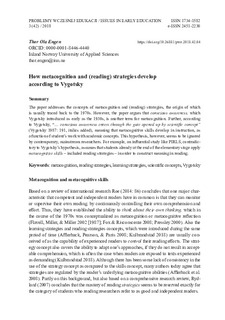How metacognition and (reading) strategies develop according to Vygotsky
Peer reviewed, Journal article
Published version

Åpne
Permanent lenke
http://hdl.handle.net/11250/2593839Utgivelsesdato
2018Metadata
Vis full innførselSamlinger
Sammendrag
The paper addresses the concepts of metacognition and (reading) strategies, the origin of which is usually traced back to the 1970s. However, the paper argues that conscious awareness, which Vygotsky introduced as early as the 1930s, is another term for metacognition. Further, according to Vygotsky, “… conscious awareness enters through the gate opened up by scientific concept” (Vygotsky 1987: 191, italics added), meaning that metacognitive skills develop in instruction, as a function of student’s work with academic concepts. This hypothesis, however, seems to be ignored by contemporary, mainstream researchers. For example, an influential study like PIRLS, contradictory to Vygotsky’s hypothesis, assumes that students already at the end of the elementary stage apply metacognitive skills – included reading strategies – in order to construct meaning in reading.
Beskrivelse
This is an Open Access article published in the journal Problemy Wczesnej Edukacji/ Issues in Early Education The article can be found on publisher's pages by following this link: https://czasopisma.bg.ug.edu.pl/index.php/pwe/article/view/1994
